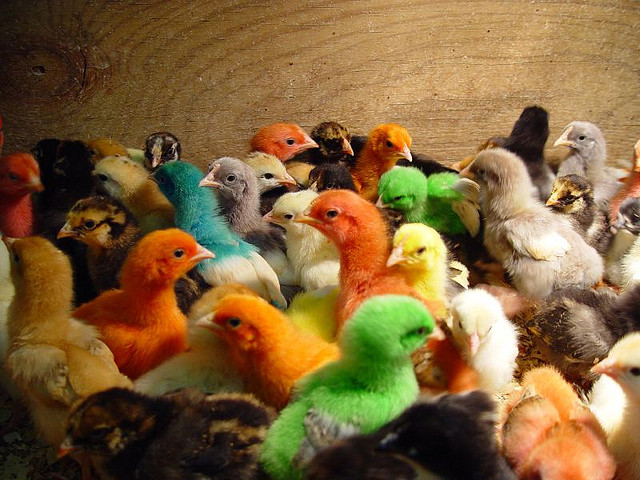February 8th’s Roundtable will be an informal discussion on how we can foster greater inclusivity in academia. Stacy and I have compiled a list of possible reading materials below (this is a condensed version of our original list, trust me). Most of them are pretty light, and we don’t expect everyone to read everything; just pick one or two that look interesting. We are particularly interested in talking about solutions to the issues that the materials below raise, so keep that in mind when you’re reading and come ready to discuss! After the Roundtable we’ll continue the conversation over drinks at happy hour (location TBA).

Image by chrisjfry
On work-life balance and parenting:
“Perspective: Embrace flexible work arrangements” – This article discusses flexible work arrangements and affordable child care, making the argument that if institutions are more flexible and child care is more affordable fewer women will leave STEM, the investment of public funds into training graduate students will yield higher returns, and productivity will increase overall.
UC family friendly policies – Relevant information for UC employees who are parents.
On diversity in STEM:
Science faculty’s subtle gender biases favor male students – This study examines gender bias in hiring in academia. When given application materials for a hypothetical lab manager position, faculty members rated male applicants as more competent than female applicants (though the application materials were identical). Male applicants were also offered a higher starting salary and more mentoring than female applicants. Faculty gender did not affect the level of bias against female applicants. There are also a few blog responses to the study: “Study shows gender bias in science is real. Here’s why it matters.” And “Why bias holds women back”
“A field guide to privilege in marine science: some reasons why we lack diversity” – In this recent blog post (which applies to disciplines beyond marine science), the author describes barriers to success in research that some people, particularly those from low socioeconomic backgrounds, face. She points out that research, especially at early stages, often demands a level of financial flexibility that is unreasonable for many, and that by being unable to afford to participate in things like REUs, people who are talented and smart find themselves at a disadvantage. The comments here are worth a read, as is this response: “A Dream Deferred: How access to STEM is denied to many students before they get in the door good”.
“Emails ignored, meetings denied: bias at the search stage limits diversity” – Researchers sent emails to professors at 258 US universities (in 89 disciplines) from fictional prospective students whose names were “randomly varied to indicate whether the sender was a man or a woman, or if he or she was white, black, Hispanic, Indian, or Chinese”. The professors were less likely to respond to email from, or grant meetings to, women and minority applicants.
“Nature’s sexism” – Nature reflects on gender imbalance in its authorship and encourages editors to ask themselves “Who are five women I could ask?” when thinking about whom to commission for articles.
“Gay in the academy” – ln this piece a professor describes his experiences and offers some words of wisdom as a gay man in academia.
Update: “Where are all the disabled scientists?” – People with disabilities are extremely underrepresented in STEM. The author of this piece interviewed various academics and researchers with disabilities to shed light on the challenges they faced.
And finally:
“The End of Men” – A longread and not specific to academia, this Atlantic piece eventually turned into a book that was published recently. Hanna Rosin writes “Earlier this year, women became the majority of the workforce for the first time in U.S. history. Most managers are now women too. And for every two men who get a college degree this year, three women will do the same. For years, women’s progress has been cast as a struggle for equality. But what if equality isn’t the end point? What if modern, postindustrial society is simply better suited to women? A report on the unprecedented role reversal now under way— and its vast cultural consequences”. The recent release of Rosin’s book sparked a response from Stephanie Coontz, followed by a rebuttal from Rosin, and an interview with them both.
If, like us, you can’t get enough of this stuff, there are a few more links below. Feel free to add your own in the comments if there’s a topic you think hasn’t been covered well here. We’re currently lacking materials on disability [Update: see above] and on transgenderism, so those would be particularly welcome.
“Race, ethnicity, and NIH awards” and “Black applicants less likely to win NIH grants”.
“How stereotypes can drive women to quit science”
“Thin ice: Stereotype threat and black college students”

Steph also suggested checking out a new paper she wrote with Carly Strasser and Josh Tewksbury on the future for ecology, which has a section on diversity (or lack thereof) in ecology: http://carlystrasser.net/wp-content/uploads/2012/07/bio.2013.63.2.2.pdf
Hey, thanks for putting this together! In the discussion I mentioned a paper that summarized how researchers’ gender alters perspectives and can change the course of questions being pursued in a field – a nice example that has always made me wonder how much our field will change as perspectives diversify even more over time:
Principles of Females’ Perspectives in Avian Behavioral Ecology
Patricia Adair Gowaty
Journal of Avian Biology
,
Vol. 28, No. 2 (Jun., 1997), pp. 95-102
http://www.jstor.org/stable/10.2307/3677302
Very related to Steph’s comment above — Ben Adams also suggested Primate Visions by Donna Haraway as a good read on the topic of gendered perspectives in the development of science. In the book, Haraway examines evidence of a male bias in primatology (at least until relatively recently). I haven’t read it, but it looks like an interesting (and provocative) read.